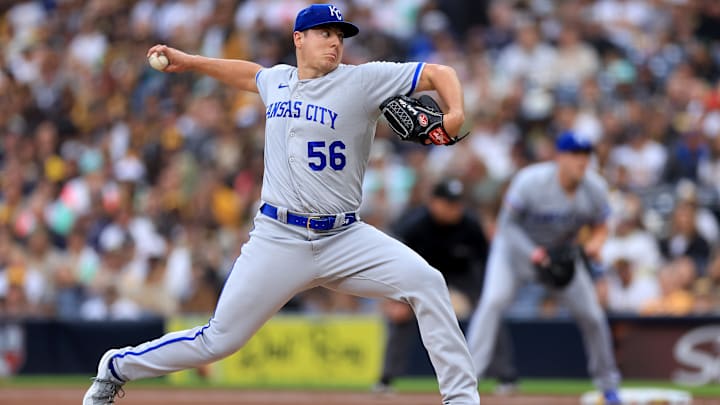The KC Royals probably didn't see coming what hit them Monday night in San Diego. Controlling them like no other pitcher has this season, the Padres' Michael Wacha impressively no-hit the Royals until Michael Massey managed an eighth-inning single. So good was Macha, in fact, that he struck out 11, more than he'd ever fanned in a big league game before, and walked only one before giving way to the San Diego bullpen immediately following Massey's hit.
The masterful performance was the primary reason the Padres cruised to a series-opening 4-0 win at Petco Park and dropped Kansas City to 19 games below .500 at 12-31.
Wacha's stellar outing cannot, however, minimize completely the impact of damage one of their own inflicted on the Royals. Starting pitcher Brad Keller, who's had his good moments this season, once again went to war with the strike zone and lost.
It was ugly.
Brad Keller's problematic pitching for the KC Royals continued Monday night
Keller went to the mound Monday evening in the midst of a slump fueled by control and command issues: in his five most recent starts before Monday's, he walked 24 batters in 22.2 innings (9.52 BB/9). He also gave up 16 runs and 27 hits in that span.
He was bad again Monday night. In the 3.2 innings he lasted until manager Matt Quatraro pulled him in favor of Max Castillo, Keller walked eight, threw two wild pitches, and hit Manny Machado, forcing the San Diego star out of the game.
And a two-out error he made extended the Padres' first inning and put a runner in scoring position who Fernando Tatis Jr. quickly singled home with the only run the Padres ultimately required. The three runs with which Keller was charged marked the fourth time in his last six games that he's surrendered three or more runs while pitching five innings or less.
He's also walked 40 in 43.1 innings; his BB/9 is now 8.31, a bad omen for a pitcher whose season BB/9 has exceeded 4.00 only once in the five seasons preceding this one.
What lies at the core of Keller's inability to throw strikes and command his better pitches well is for him and the Royals' new pitching gurus to determine. Curing Keller of whatever ails him will do much to improve the club's chances to at least compete more frequently, and strengthen what may be an increasingly fragile position in the Royals' rotation.
Improvement must come quickly for Keller. If it doesn't, he could find himself back in the bullpen, where he ended last season after struggling too long as a starter,
